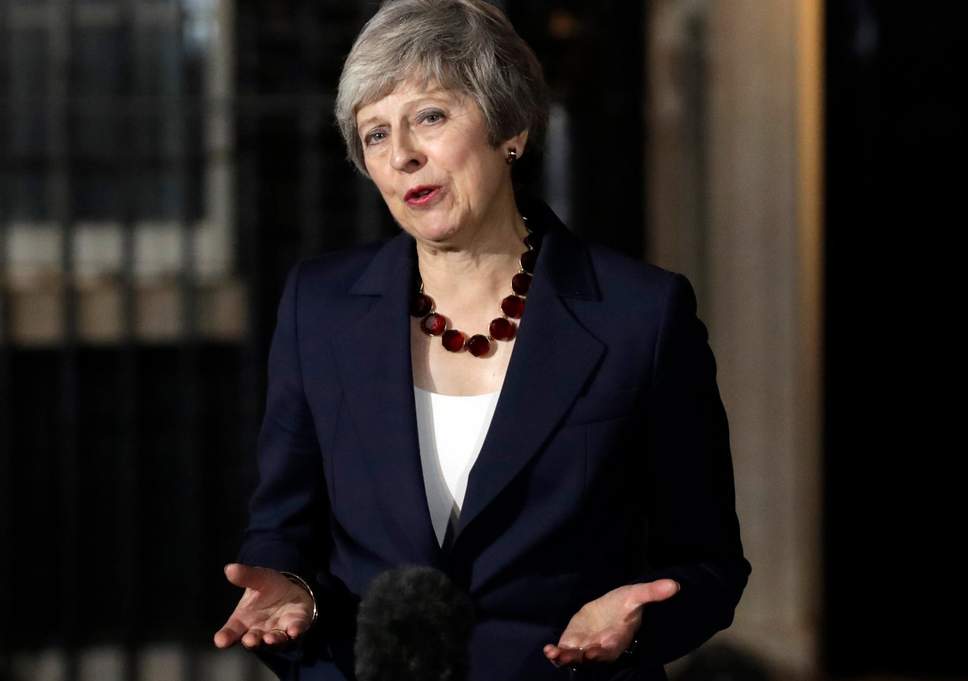This post has already been read 1915 times!
Prime Minister Theresa May battled on Thursday to save a draft divorce deal with the European Union after her Brexit secretary and other ministers quit in protest at an agreement they say will trap Britain in the bloc’s orbit for years.
Just over 12 hours after May announced that her team of top ministers had agreed to the terms of the draft agreement, Brexit minister Dominic Raab and work and pensions minister Esther McVey quit, saying they could not support it.
Their departure, and the resignations of two junior ministers, shakes May’s divided government. Raab is the second Brexit secretary to quit over May’s plans to leave the EU, the biggest shift in British policy in more than 40 years.
By leaving now, some suggested that Raab could be positioning himself as a possible successor to May.
But the prime minister showed little sign of backing down in parliament, where she warned lawmakers they now faced a stark decision – choose to leave with no deal, risk Brexit never happening or back her deal.
“The choice is clear. We can choose to leave with no deal, we can risk no Brexit at all, or we can choose to unite and support the best deal that can be negotiated,” she said.
She acknowledged that hammering out an agreement with her cabinet was not “a comfortable process.”
But she told those lawmakers who believed she could get a deal that did not include a backstop arrangement to prevent the return of a hard border on the island of Ireland that they were wrong.
STRATEGY IN DOUBT
It was the backstop arrangement, which would see Britain and the EU establishing a single customs territory, that spurred her Brexit secretary and work and pensions minister to resign.
“Above all, I cannot reconcile the terms of the proposed deal with the promises we made to the country in our manifesto at the last election,” Raab said.
“This is, at its heart, a matter of public trust,” Raab said. “I cannot support the proposed deal.”
Less than five months until Britain leaves the EU on March 29, the resignations put May’s Brexit strategy in doubt.
EU leaders are ready to meet on Nov. 25 to sign off on the divorce deal, or Withdrawal Agreement.
French Prime Minister Edouard Philippe summed up the uncertainty, saying events in London raised concerns about whether the agreement would be ratified. “We need to prepare ourselves for a no-deal Brexit,” he said.
Some lawmakers in London openly questioned whether May’s government will survive.
‘FALLING APART’
Britain’s opposition Labour Party said the government was “falling apart.”
“Theresa May has no authority left and is clearly incapable of delivering a Brexit deal that commands even the support of her cabinet, let alone parliament and the people of our country,” said Jon Trickett, a member of Labour leader Jeremy Corbyn’s senior team.
Raab, 44, was appointed to the role of Brexit secretary in July this year following the resignation of his predecessor David Davis, who also quit in protest at May’s Brexit strategy.
At the heart of Raab’s criticism of May’s deal was the belief that the pursuit of a customs union with the EU would be the “starting point” for talks on the future relationship with the bloc, “severely prejudicing” what Britain could achieve.
He said May’s plan threatened the integrity of Britain and he could not support an indefinite backstop arrangement – to prevent a return to a hard border on the island of Ireland – where the EU had a veto over Britain’s ability to exit.
The backstop arrangement to come into force if a future trade deal does not prevent the return of a hard border between the British province of Northern Ireland and EU-member Ireland has long been the main obstacle not only to a deal with the bloc, but to any agreement of her top ministers.
Northern Ireland’s Democratic Unionist Party (DUP), which props up May in parliament, had threatened to pull its support from the minority government if the backstop meant the province was treated differently from the rest of mainland Britain.
“No democratic nation has ever signed up to be bound by such an extensive regime, imposed externally without any democratic control over the laws to be applied, nor the ability to decide to exit the arrangement,” Raab said in his resignation letter.
Eurosceptics in May’s party have long feared that the prime minister was leading Britain towards a customs union with the EU, something that, they say, would mean a Brexit in name only.
Nigel Dodds, the DUP’s deputy leader, welcomed the resignations, praising the ministers for standing up for “the Union.”
[HuffPost]



